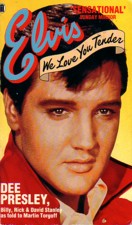Elvis:
We Love You Tender
Presley,
Dee, Billy, Rick & David with Martin Torgoff; New English
Library; 1980; 1981; ISBN: 0450051358; Softcover
|
David
Neale once wrote of this book: "Do they? Did they?
Highly forgettable. As much a self-agrandising effort
on the part of Dee Presley as a book about Elvis. The
Stanley brothers seem to have enjoyed their time with
Elvis and one wonders if they fully realised what their
mother was up to when she got them to work on this piece
of nonsense."
The
Sun newspaper said about the book: "Elvis as he
really was...for the first time his close family have
set downb the truth about the extraordinary man they
loved as a son and a brother. Their story is funny,
shocking and finally tragic."
|
 |
EIN:
While I don't fully agree with David Neale's view (and Elvis:
We Love You Tender is certainly not the best book from Elvis'
"second" family), it is an interesting one when considered
in the light of subsequent books from members of the Stanley
family and more recently the statements of David Stanley in
several interviews, including two with EIN.
So
what of Elvis: We Love You Tender? Undoubtedly it has that
mass market paperback (tabloid if you prefer) feel about it.
And a number of its stories have since been contradicted by
the Stanley's themselves. But does this totally devalue what
is in the book?
It
can often be a mistake to focus solely on the weak and/or
sensationalist points of a book. In so doing it is easy to
miss other things that offer a greater insight into the subject.
Elvis:
We Love You Tender is a book destined to be maligned, but
a book that nevertheless offers much. If we can divest ourselves
of prejudicial. jaundiced and emotionally charged views on
the book, it is possible to peel away the layers of hyperbole
and find many carats of gold that enrich our understanding
of Elvis Aaron Presley. And the insights traverse both positive
and negative issues.
Elvis
on the emotional needs of women:
"Elvis
Presley often spoke to his brothers about the special emotional
needs of women and how they never got enough credit for the
wonders they bring to the world and the struggles they face.
He believed that God put women on the earth to be, well, women
- to be put on that golden pedestal where they could best
be respected, exalted, and loved. How he managed to lose the
most important woman in his life will always remain a painful
irony to all who knew him."
Therein
that passage lies the real flaw with Elvis: We Love You Tender.
The subject matter has merit and bears examination in the
Elvis story, but Martin Torgoff's "tabloid" manipulation of
the facts stretches them until the connotation becomes almost
derisory.
If
one takes the time to accept a natural narrative bias towards
its authors and dig within the pages of the book, there is
a rich vein to be mined. Life growing up at Graceland, Vernon
and Dee's differing sex needs, an underlying tension between
Elvis and Dee, and the impact of Freddie Prinze's suicide
on Elvis are just some of the many interesting stories and
issues that expand our knowledge of the Elvis story.
Verdict:
Elvis: We Love You Tender suffers from the same malady as
Elvis: What Happened? Its tabloid representation of the Elvis
Presley story emphasising sensationalism over analysis and
prosaic explanation means few will take the time to explore
beneath its politically incorrect narrative to identify the
many truths and insights it offers.
Click
to comment on this review
Read
EIN's reviews of David Stanley's other books about Elvis:
Life
With Elvis
Raised
On Rock Growing
Up at Graceland
The
Elvis Encyclopedia
Interviews
with David Stanley:
David
Stanley talks to EIN (2004)
David
Stanley talks to Madeleine Wilson (2003)
David
Stanley talks to EIN (2002)
|



